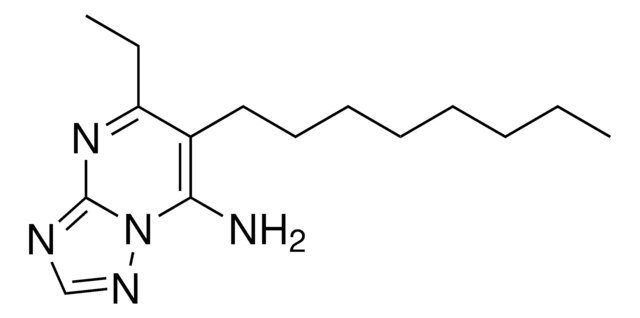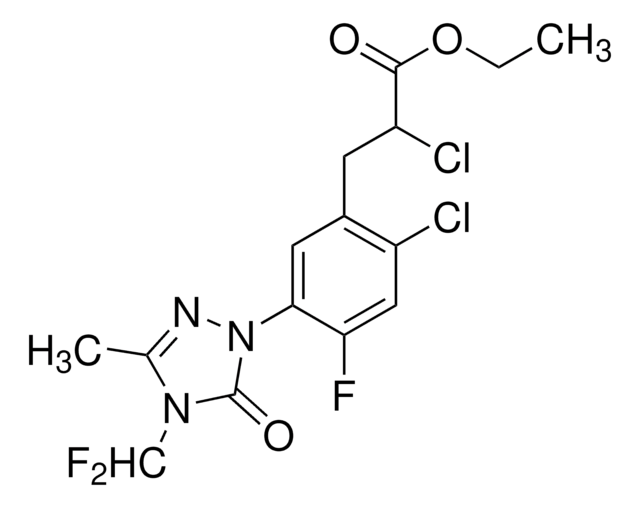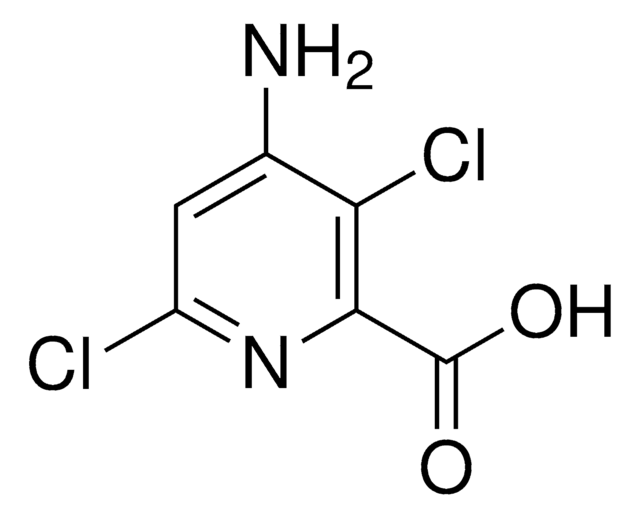93683
Ametoctradin
certified reference material, TraceCERT®, Manufactured by: Sigma-Aldrich Production GmbH, Switzerland
Synonyme(s) :
5-Ethyl-6-octyl[1,2,4]triazolo[1,5-a]pyrimidin-7-amine
About This Item
Produits recommandés
Qualité
certified reference material
TraceCERT®
Niveau de qualité
Gamme de produits
TraceCERT®
Durée de conservation
limited shelf life, expiry date on the label
Fabricant/nom de marque
Manufactured by: Sigma-Aldrich Production GmbH, Switzerland
Température de stockage
−20°C
Chaîne SMILES
CCCCCCCCc1c(CC)nc2cnnn2c1N
InChI
1S/C15H25N5/c1-3-5-6-7-8-9-10-12-13(4-2)19-15-17-11-18-20(15)14(12)16/h11H,3-10,16H2,1-2H3
Clé InChI
GGKQIOFASHYUJZ-UHFFFAOYSA-N
Vous recherchez des produits similaires ? Visite Guide de comparaison des produits
Catégories apparentées
Description générale
Ametoctradin is a fungicide that belongs to the class of triazolo-pyrimidylamines in FRAC group 45. Ametoctradin is a mitochondrial respiration inhibitor that binds to the complex III (complex bc1) in the electron transport chain of oomycete pathogens, causing a rapid decrease in oxygen consumption and intracellular ATP levels. It is effective in controlling late blight and downy mildews in potato, grape, cucumber, apple, tomato, and other crops.
Ametoctradin has to be monitored in the Multiannual Control Programmes for Pesticides Residues (MACP), run within the EU and EFTA in/on products of plant origin.
Ametoctradin is approved for its use in the EU under Reg. (EC) No 1107/2009. Maximum residue levels (MRLs) have been set according to Reg (EC) No 2021/1110 for ametoctradin for various products of plant and animal origin from 0.01 to 60 mg/kg.
Application
Ametoctradin CRM may also find its use as described below:
- QuEChERS method to analyze ametoctradin residue in apple, cucumber, cabbage, tomato, and grape using UPLC-MS/MS.
- Comparative study of three sample preparation methods for multi-residue extraction of pesticide residues analysis in hop matrix.
- Simultaneous and rapid analysis of 300 pesticide residues in human hair using LC-MS/MS and GC-MS/MS.
- To determine the behavior of field-applied pesticides in barley during the malting and mashing stages of beermaking.
- To study the effect of new generation fungicides on Saccharomyces cerevisiae growth, grape must fermentation, and aroma biosynthesis.
Produits recommandés
Informations légales
Mention d'avertissement
Warning
Mentions de danger
Conseils de prudence
Classification des risques
Acute Tox. 4 Oral
Code de la classe de stockage
11 - Combustible Solids
Classe de danger pour l'eau (WGK)
WGK 3
Point d'éclair (°F)
Not applicable
Point d'éclair (°C)
Not applicable
Faites votre choix parmi les versions les plus récentes :
Certificats d'analyse (COA)
Vous ne trouvez pas la bonne version ?
Si vous avez besoin d'une version particulière, vous pouvez rechercher un certificat spécifique par le numéro de lot.
Déjà en possession de ce produit ?
Retrouvez la documentation relative aux produits que vous avez récemment achetés dans la Bibliothèque de documents.
Notre équipe de scientifiques dispose d'une expérience dans tous les secteurs de la recherche, notamment en sciences de la vie, science des matériaux, synthèse chimique, chromatographie, analyse et dans de nombreux autres domaines..
Contacter notre Service technique








